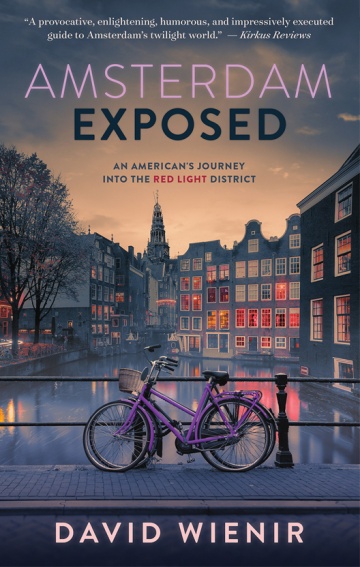Columbia College | Columbia University in the City of New York
David Wienir ’95 Goes Dutch in an Unusual Coming-of-Age Tale
When anyone mentions Amsterdam, you probably think: Van Gogh. Anne Frank. Bicycles. Canals. You might also think: Hookers. The infamous Dutch capital is known for all of those things, but David Wienir ’95’s memoir, Amsterdam Exposed: An American’s Journey Into the Red Light District (De Wallen Press, $12.95), is primarily concerned with the latter.

The coming-of-age story, which recently won the grand prize as the Top Book of 2018 at the Hollywood Book Festival, describes the author’s friendship with a Dutch prostitute named Emma, but is also about a young man stepping outside his comfort zone. “I think it’s a very different book than what people might imagine,” Wienir says. “This is not a survey of the sex worker industry; it’s a story that can shape how we see the world.”
Still, the provocative subject matter kept Wienir, now an entertainment lawyer based in Beverly Hills, from writing his story for 18 years. “I was afraid to share myself,” he says. “When you’re in corporate America, it’s almost as though you’re told to check your personality at the door. It took me a long time to find the necessary vulnerability.”
Wienir was 26 and a third-year law student at UC Berkeley in 1999 when he took a semester to study international law in Amsterdam. Feeling pressured to “sell his soul” in exchange for a corporate law career, he recalls the decision to travel to Holland as an opportunity to “break free” from a more traditional law school path. He arrived knowing he wanted to write a book about the red light district, hoping to introduce readers to the women who worked the windows and share their perspectives on the industry from a Dutch point of view. Wienir explored the seedy neighborhood, asking for interviews and trying to make connections before ultimately forming an intense but platonic bond with 24-year-old Emma. He writes a poignant, heartfelt letter to her in the book’s epilogue.
“I hope the book finds its way to Emma,” Wienir says. “There’s a lot that this book gets at, but one of the main objectives is to humanize the women there and have a conversation about the issue in a different way. It’s a subject that touches mainstream society a lot more than we want to acknowledge.”

COURTESY DAVID WIENIR ’95
He was the president of Carman Hall, a member of Alpha Delta Phi Literary Society and a co-founder of the Uptown Vocal a cappella group. Studying abroad as a junior in the Oxbridge Scholars program was a big part of Wienir’s College journey and started his love affair with Europe. He thinks fondly of the Core to this day: “It’s been everything to me,” he says. “It’s given me an ability to think deeply about things and care about ideas.
“To me, Columbia was about searching,” he says. “Diversity was welcomed, and people were genuinely interested in how others came to certain understandings. That foundation led me to want to be a writer, to be willing to strip myself of preconceived notions and explore. Columbia for me was not about fitting in; it was about being different.
“We’re so quick to label everyone around us,” he continues. “Republicans, Democrats, lawyers, prostitutes. But we’re also quick to label ourselves. We all want there to be order in the world so that we can make sense of it. But by doing that we put people in cages, and ourselves, too.”
Wienir has written three other books; he’s dedicated this one to his wife, Dr. Dina, a pioneer of the legal cannabis movement in California and the inspiration for the Nancy Botwin character on the Showtime series Weeds. He now works in a creative environment at United Talent Agency, and says his colleagues have been beyond supportive.
Ultimately, he believes his chutzpah comes from Columbia: “There are extraordinary things waiting for you if you put yourself out there. Go knowing you’re smart and be comfortable searching. My time at the College gave me the courage to go places other people might not have been comfortable going.”
And to anyone aspiring to be creative in corporate America, Wienir offers this advice: “Just do it. If there’s something you need to write or something you need to say, there’s a path that’s there for you.”
Issue Contents
Published three times a year by Columbia College for alumni, students, faculty, parents and friends.
Columbia Alumni Center
622 W. 113th St., MC 4530, 6th Fl.
New York, NY 10025
212-851-7852
cct@columbia.edu
Columbia Alumni Center
622 W. 113th St., MC 4530, 4th Fl.
New York, NY 10025
212-851-7488
ccalumni@columbia.edu

